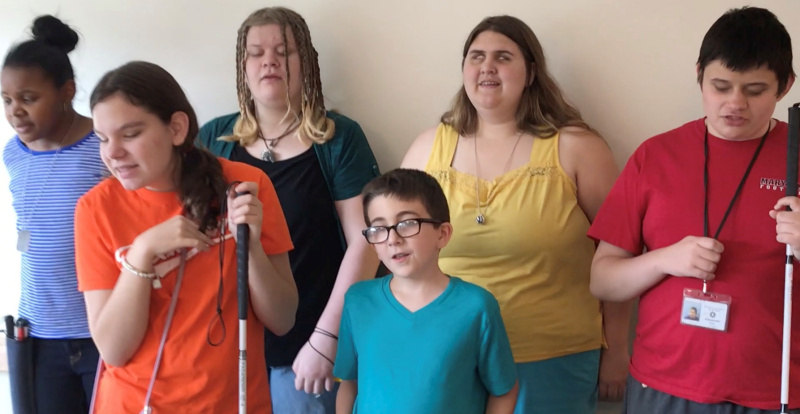
Seeing Through Music
Songwriting at the Maryland School for the Blind
by Valerie Leonhart Smalkin
This is about six blind teens who bravely revealed their hearts in song, and by doing so gained the interest and contributions of award-winning musicians, writers, composers, engineers, and choruses across the nation.
It all started with CMN member Irene Light’s idea to create a program for the Maryland School for the Blind (MSB) Statewide Outreach program. Irene is the Director of East Coast Productions for Theatre Arts Festival for Youth (TAFFY), a nonprofit organization that sends professional artists into underserved communities of children and families. In that role, and in conjunction with the social workers at MSB, Irene arranged for a single Saturday afternoon songwriting session for teens. The purpose of the session was to help those teens self-advocate and inform the sighted world about being blind. Irene asked me to do the program and I said sure, not knowing what a profound effect the program would have on the two of us and an ever-widening circle of good-hearted people.
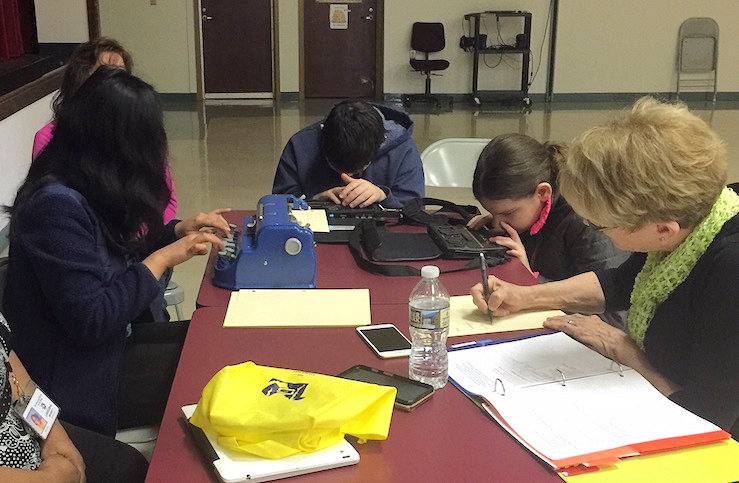 (Photo by Susan Vanderhoff)
(Photo by Susan Vanderhoff)
At the original session, held in the open space “gymnatorium” at MSB, the teens said they want sighted people to have a better idea of what it’s like to be blind. So I asked, “What is it like?” And the answers poured out:
It sucks.
Being blind is horrible.
Depressing,
Being depressed is horrible.
Having people look at you everyday…
I don’t know why they make me feel this way.
You can feel their eyes on you.
It’s weird when you are standing there and someone’s looking at you and you want to turn around.
You feel like you stand out with a cane.
I gulped and asked, “So what do we need to do to get over that feeling?” Again, the teens were not hesitant with the answers:
 Alex
Alex
Write an anti-depression song
Never give up
Write a fight song—the greatest
Support each other
Find support
There’s a lot of things I can do,
In a different way…
Don’t treat me like a baby!
Just because I’m blind doesn’t mean I’m not capable of doing things other people can do. Some things even better.
Wow! Then something prompted Alex, mildly autistic and blind from birth, to talk about a great friend he had in eighth grade. His friend transitioned to a regular high school, while Alex came to MSB. He misses her terribly. They used to call every night, e-mail, and chat, but now he no longer hears from her. Alex became very agitated and sad, so much so that the social worker took him out to process his feelings on a one-to-one basis.
Meanwhile, Raiven, who is severely color-blind since age eleven, and will eventually lose more of her sight, was busy writing on her chair. When she finished she presented us with her interpretation of what Alex had been saying:
Move On
I need another friend.
No matter how far away you are
I’ll care about you
No matter what you do
How about you
No, you never understand
The way I want to talk to you
I can’t take this anymore
How can I format these words
Never wanting to know all I do
I never need to give up
I try my best
But I don’t know if you understand
The way I care about you
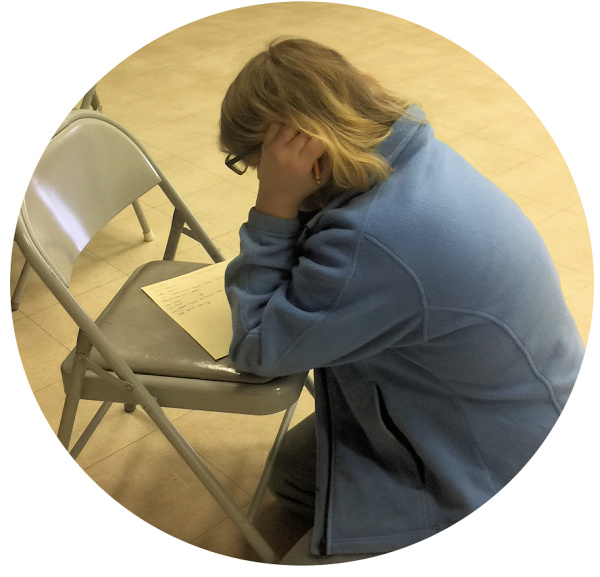 Raiven
Raiven
I did not know Raiven well at that point, but later her characteristic shyness with the spoken word and stream-of-consciousness facility with the written word surfaced plainly. (If you watch the video below of Raiven playing bass clarinet, you’ll note she would not let me video her face. I had to promise only to show the bell of the clarinet and her feet.)
Truthfully, the first session was not a great success from a songwriting point of view, but as to self-advocacy? It was surely a homerun. All six teens were anxious to tell the sighted world more about themselves. I left knowing I could not simply walk out of these students’ lives after a single day. They were too vibrant, too in need of a voice, too lovely and caring.
That very evening, November 5, 2016, I went home and posted this on Facebook:
Okay! I need funding to get me back to the Maryland School for the Blind to help these wonderful students finish the song they have started about how they feel and what they need sighted people to know about them. My yearlong plan is to get them in a studio to record their song. Anyone in? Either monetarily or time-wise?
The next day, a longtime friend anonymously donated $1,000 to TAFFY to pay for four return visits and the recording of at least one song. I was in heaven. Her faith in me made my heart grow ten sizes.
On December 12, 2016, Tatyanna, a student who had not attended the first session but heard about it, sent me this e-mail:
Hi,
It's Tatyanna.
I have a few ideas on lines for the song.
I was wondering if you could tell me what you think?
People stare,
back away scared,
I try to act like the whispers don't bother me,
I take a deep breath and count to three.
Take a short walk around the neighborhood,
You pretend to be my friend just so you can look good,
I wipe away the tears,
tell myself there is nothing to fear,
because my friends and family are right here.
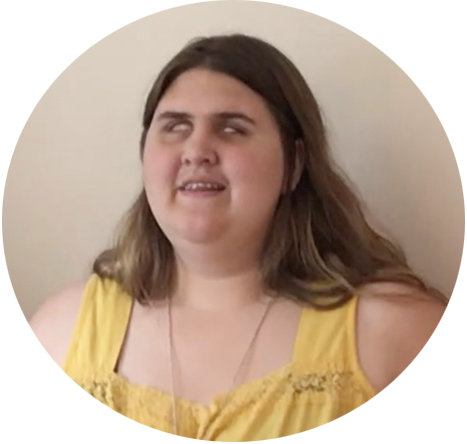 Tatyanna
Tatyanna
I was blown away by Tatyanna’s insightful line, “You pretend to be my friend just so you can look good.” So I wrote back to ask her how she came to write and think that. Her heartbreaking response came that very same day.
Thank you :)
It started in middle school. Since I went to public school I always needed some extra help. It was mostly in gym that I needed the most help. I could run and do everything but I needed someone to tell me what way to go and where the ball was.
My gym teachers would tell the class “whoever helps Tatyanna today will get extra credit.” A few people would act like my friend so I would ask to be with them the next gym class. After a while people figured out that if you help the “blind girl” you get praised and everyone looks at you like you’re some kind of hero. So, everyone in school would and still does act like my friend. At first, I really thought they were my friends but then I realized it was all an act. For example, in 7th grade a girl named Hannah pretended to be my friend. I thought she was the most amazing person. We did everything together. But, if I talked to her privately or outside of school she gave me the cold shoulder.
In 8th grade, me and Hannah didn't have any classes together but I still saw her in the hallways and in the locker room and when I said hi or ask how she was doing she pretended not to hear me. Honestly at first, I thought she really didn't hear me, but it went on and on. She never answered me. She would continue to talk to her friends like I didn't even speak. This type of situation happens all the time for me.
Taty attended the second songwriting session on January 21, 2017, and crafted the following stanza:
I try to pretend the whispers don’t bother me.
I take a deep breath and count to three.
People stare and back away scared.
They use me, and abuse me, then throw me away.
During that same workshop the teens were forthcoming about things they “see” but not with their eyes. Raiven, at her usual place bent over a notebook on a chair writing furiously, distilled this from what the other students were saying:
Blindness
Some may say that it’s a weakness
but we know that is not true
we will do
we will see
the truth behind beauty.
We will know
the hidden underlining meaning
of truth
the freedom
of beauty.
Why do you look at me at a far
I’m no different than you are
Why stare at me through fear
I feel the same way that you do
Though I may act different
I am no different than any one of you are
Treat me the same as you.
….
Please, I beg of you not to stare from the distance you are
Though I can’t see who you are
Though I can feel your personality though so far.
Sometimes I am tempted to correct Raiven’s grammar, but I don’t, because I have come to appreciate her particular way of speaking. Her mind rockets from idea to idea, words flowing without the restraints of grammar. It’s beautiful to observe, and over the past year she has grown amazingly in her ability to craft prose poems. Recently she wrote:
The ones without sight
Are not the ones without the truth
Rather the ones without the fright
Of in which society sees
The spirit of truth
Is not shown through the gravest new trend
Rather the light which shines bravely
Throughout the hardships once faced
Let her words wash over you and feel their strength. Ideas like these resulted in the next version of “Not With My Eyes”:
Hero or Not With My Eyes
So, you want to look good,
And be a hero
You pretend you’re my friend
When to you I am zero.
So, I take a deep breath and count to three
And pretend your pretense doesn’t bother me.
Some people are scared
Some people will stare
Some people abuse me
And others will use me
But I’ve nothing to fear
I wipe off the tears
‘Cuz family and friends
Are always right here.
But, you cannot wipe off
The truth of your lies.
I see to your soul
And not with my eyes.
So, I take a deep breath and count to three
And pretend your pretense doesn’t bother me.
But, you want to look good,
Appear kindly and wise
But I see your sad truth
And not with my eyes.
Not With My Eyes
As we developed these ideas further and decided to add a more positive section, “Not With My Eyes” evolved to this:
Not With My Eyes
Words by MSB Song Writing Workshop
Music and Arrangement by Valerie Smalkin
©2017 Small Kin Music
Can’t see the light, but I see clearly
Nothing in sight, yet I see clearly,
You want to be a hero.
Pretend you’re my friend.
I know you think I’m zero.
Worth nothing in the end.
So I take a deep breath, count to three,
Pretend your pretense doesn’t bother me.
But the truth of your lies isn’t easy to hide.
I see your truth, but not with my eyes.
Some folks are scared, and
Some folks will stare and
Some will abuse me,
But you! You use me.
So I take a deep breath, count to three
And know your pretense doesn’t bother me.
For the truth of my life isn’t easy to hide.
I see your soul, but not with my eyes.
I see you in a different light.
I see you with a different sight.
I see you and I understand.
So I take a deep breath, count to three
And know your pretense doesn’t bother me.
’Cuz the truth of our lives isn’t easy to hide.
I see your heart, but not with my eyes.
So I take a deep breath, stand with pride,
Look at you, understanding why,
You are limited by the things you see.
You don’t have the gift
That was given to me, that was given to me.
Maybe I’m blind, but I see clearly
Where there’s no love, I will love dearly.
To tell the truth, I composed the music for “Not With My Eyes” and quickly recorded a rough copy so that I would have at least one song done and could stop worrying. But there was no need to worry. Over the next year, the MSB students wrote two more absolutely amazing songs: “The Dance of Freedom” and “Lifeboat to Sanity.”
“The Dance of Freedom,” recorded in February 2018, has a marvelous genesis. One day I asked the students to get up and dance in the open space we were working in. I asked them what it felt like. Alex responded, “Freedom!” And I knew we were on to something. The first title was “The Blind Dance of Freedom,” but as the lyrics changed to include sighted as well as blind people, we dropped the word “blind.”
These are the student’s original lyrics that were later crafted into the song:
Why do you call beauty looks
I fear that I stand there and you stare
Can’t tell where but why stare
Just come over and talk
And
We will conquer the world as one
We will be joyous and dance
A dance filled with freedom
We will unite the world as one
Although we know the world will be united
We may not even see our project
But we see the beauty in this life.
We will always know the truth
And beauty of the freedom
Of happiness.
The students took great delight in the double meaning that 1) they may not live long enough to “see” or experience the world united, and 2) even if they do, they will not “see” it visually as sighted people do. In the next several workshops we refined “The Dance of Freedom” to this:
The Dance of Freedom No. 2
Lyrics by: Alex, Julia, Grace, Raiven, Destiny,
Brianna, and Val Smalkin
Chorus:
The world will be united
As we dance the Dance of Freedom.
Whether blind or whether sighted
We all dance the Dance of Freedom.
I feel your distant stare
I know that you are there.
Please come and talk to me
Let's try things differently.
We like to say we are not blind
But our eyes are on time-out.
Our ears work overtime you see
We hear and see things differently.
Chorus
You see with your eyes, I see with my mind.
I see with my ears, I see, though I'm blind.
This lack of sight does not make me weak
This lack of sight makes me unique.
But you, too, have that special thing
That gives you your own song to sing.
Our differences can make us strong
Our differences have built this song!
Chorus
Coda:
The dance of freedom is unity,
The dance of freedom is energy
So come and join the dance with me
Though we may do it differently.
Yes, come join the dance with me.
And where it takes us, we will see.
I sent the “Dance of Freedom” lyrics to Dave Kinnoin and asked if he would set them to music. Bless his soul, he agreed. He and Jimmy Hammer not only wrote the music but also made an accompaniment track. With the permission of our students, Dave changed the order of the first lines of the chorus and asked if we could change the line “But our eyes are on a time-out.” The students settled upon “we see with our hearts, our souls, our minds.”
Student lyrics |
Edited |
The world will be united
As we dance The Dance of Freedom.
Whether blind or whether sighted
We all dance The Dance of Freedom. |
We will dance the dance of freedom,
Whether blind or whether sighted.
We will dance the dance of freedom,
And our hearts will be united. |
We like to say we are not blind
But, our eyes are on time-out.
Our ears work overtime you see
We hear and see things differently |
We like to say we are, we are not blind,
We see with our hearts, our souls, our minds.
Our ears work overtime, you see.
We hear and see things differently |
I suppose you are anxious to hear the song, and this is where the story gets even more amazing. Because “The Dance of Freedom” was about uniting sighted and unsighted people, Irene and I thought getting another group to record would be great, and I remembered the West Los Angeles Children’s Choir from a wonderful video posted on the CMN forum. The choir is well known for recording “Prayers for the World” with Cher (for the documentary Cries from Syria), and appearing on a 2017 holiday Gap commercial. Irene had a connection—of course!
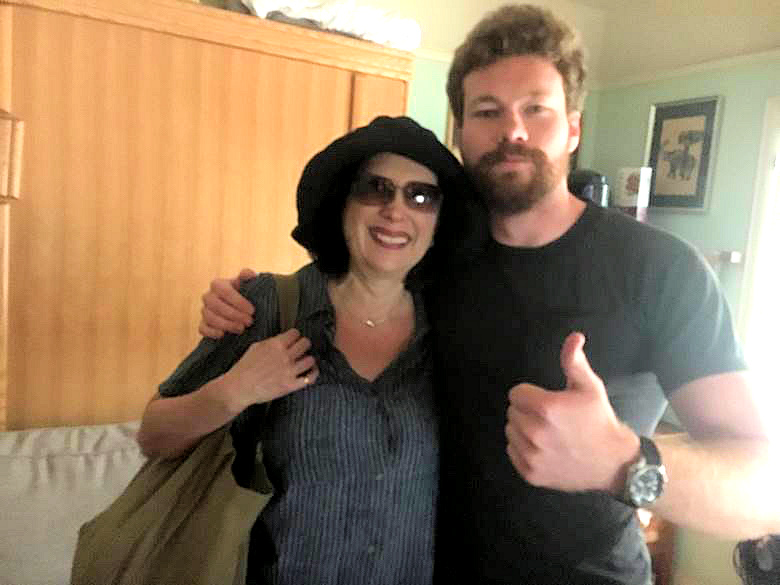 Oliver Kinnoin and Barbara Silberg
Oliver Kinnoin and Barbara Silberg
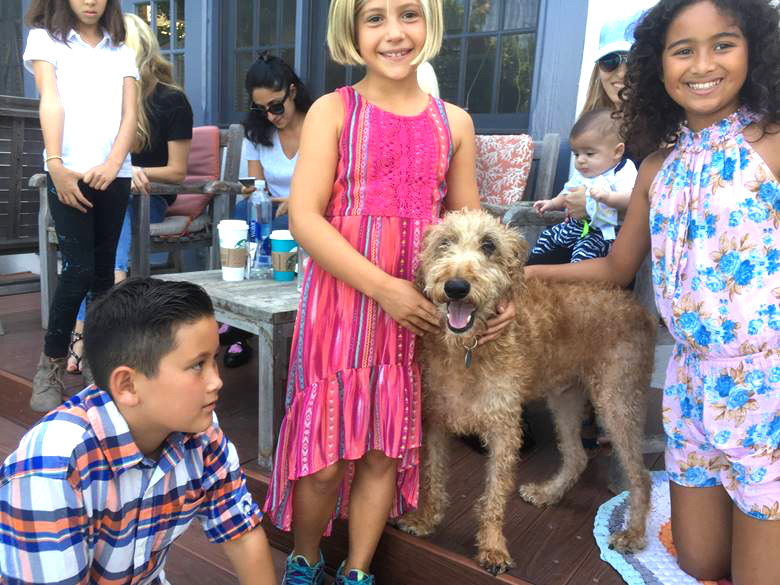 West Los Angeles Children‘s Choir at the Kinnoins‘
West Los Angeles Children‘s Choir at the Kinnoins‘
After one phone call and a few e-mails back and forth, Barbara Silberg, the director of the West Los Angeles Children’s Choir, agreed to teach her choir “The Dance of Freedom.” Again Dave Kinnoin, Oliver Kinnoin, Mary Kincaid, Randy Sharp, and Jimmy Hammer came to the rescue by opening their homes and hearts to twenty-five children and parents. Dave’s son, Oliver, provided the studio and recording expertise; Randy Sharp provided equipment: Dave’s wife, Mary Kincaid, helped supervise; while Dave himself entertained the children with games outside and provided cookies. Mark Stocker, another CMN member, mixed the version you will hear by clicking HERE!
The universal appeal of the MSB students’ songs and the depth of their self-expression has led to donations of time and talent beyond my imagining. During this entire project, Kabir Sehgal, a children’s author and jazz record producer who happened to like my book Springtime Dance, has acted as my advisor. He also agreed to write the CD liner notes. Through Kabir, I met writer and lyricist Mike Greenly. Mike was so taken by the students’ songs that he donated $1,500 to TAFFY to pay for the CD production and has contributed another $500 for publicity. And the list grows! Paul Avgerinos, composer of Grammy-winning music for spoken word pieces, opened his catalogue of music for us to use in any spoken word pieces we include in this project. Dirk Joseph, a local Baltimore visual artist, is donating the CD cover art, which will include braille. Beth Blenz-Clucas of Sugar Mountain PR is helping with publicity.
Of course, Dave Kinnoin jumped in at the very beginning as did Sahffi Lynne, another local Baltimore artist. And let’s not forget twenty accessible MP3 players donated by Child’s Play Charity.
There is one more song to write about…but I’m going to save that for another day.
Keep in mind that you could reproduce this program in any school near you. Why not give it a try?